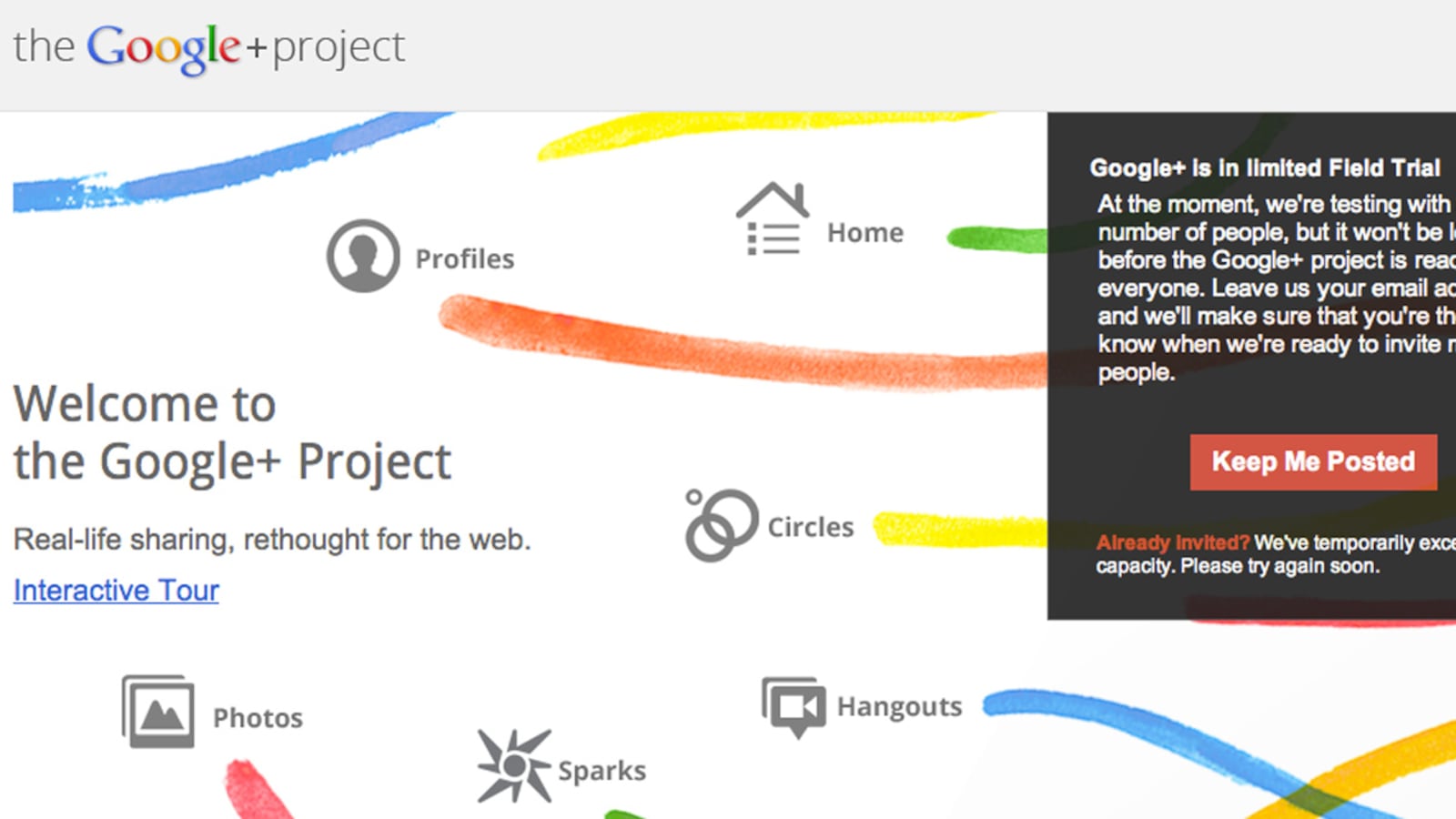Google began rolling out its ambitious new social-networking project Wednesday with the premise that “online sharing is awkward.” The process may even be broken, Google surmises. But the Internet search giant is here to fix it. “We’d like to bring the nuance and richness of real-life sharing to software. We want to make Google better by including you, your relationships, and your interests,” the company said in announcing the initiative on its blog. “And so begins the Google+ project.”
Circles. Sparks. Hangouts. Huddle.
These four words make up the backbone of Google+, an ambitious attempt to rework the way we interact with content on the Web and our real-life social networks—our parents, our best friends, our co-workers.
To introduce this concept to the masses, the company has undertaken a so-called limited field trial wherein certain members of the tech media—deemed influencers by Google—were given a number of invites to loop in the people they interact with most. The result: waves of coverage throughout the tech press touching on everything from the case for its soft launch period, the lessons learned from its failed Buzz product—Google’s first foray into social networking—and how Google+ can find success. (Fifteen members of the Newsweek/Daily Beast team got their invites, but we’re going for a longer-term impression after a few days of playing around.)
Here’s what those who have tried Google+ are saying:
The Promise
A keystone of the new Google+ project is Circles—groups of friends a user has divided up into categories like Friends, Family, or Co-Workers. It is here that The Guardian’s Charles Arthur sees the most promise. “That’s really neat, I thought; this is a clever way to categorise people, and stop what I do or say from bumping into each other,” he writes. But quickly, Arthur realized our networks—mostly based on email contacts, at this point—are extensive. “Quite quickly the Circles dashboard starts looking like the cabin of a 747—all those buttons and dials,” he writes, “and one gets the uncomfortable feeling that you’re never quite going to be finished with doing it.” The New York Times notes the same thing: “It is meant for sharing with groups—like colleagues, roommates, or hiking friends—not with all of one’s friends or the entire Web.”

The Privacy
The team working on Google+ clearly examined the missteps of Buzz in addressing the value it would place on privacy. As you may remember, Buzz launched to much acclaim as a Facebook killer. But quickly, users realized that opening their email networks to the world brought with it unforeseen implications. Google+, on the flip side, “sports a clean, well-designed user interface that arguably offers greater privacy protections than Facebook,” writes Declan McCullaugh at Cnet. He points to examples that make the point: simplified privacy settings, no requirement for a real name, enhanced privacy choices on profile information, and a clear sense of who sees what content you’ve published. Lauren Weinstein of People for Internet Responsibility adds that Google+ “treats us as adults able to determine our own relationships and sharing preferences,” whereas Facebook treats us like sheep. That’s bad news for Facebook, which may be hoping to hang on to those wary of that company’s neverending issues with privacy.
The Interface
Writing at SearchEngineLand, Greg Sterling calls Google+’s interface “familiar and relatively intuitive,” even if that takes some getting used to. “There are some subtle differences in how you invite friends and so on,” adds Matt Rosoff at Business Insider, “but the MAIN page—the page that shows up when you click your +name (I’m ‘+Matt’) in the black Google toolbar at the top of Google’s search page, and that serves as headquarters for all your Google+ activities—looks almost EXACTLY like Facebook.” There’s the stream (News Feed). The “Share what’s new…” status bar that looks strikingly like Facebook’s, “What’s on your mind?” And there’s the profile—offering a Facebook-like format complete with a profile picture in the upper lefthand corner of the page. The Web comic xkcd skewers these similarities in three comics frames posted online Wednesday. “You should join Google+,” one stick figure says to the other. “What is it?” “Not Facebook!” the first answers. “What’s it like?” asks the second. “Facebook!” “Oh what the hell,” says the second. “I guess that’s all I really wanted.”
The Discovery
Poynter, the journalism institute, says Google+ “creates new ways for people to discover news and other content on the Web.” It does this, the organization says, through its “stream” and “sparks” features. The former looks much like the News Feed on Facebook, where users get updates from friends and media outlets they’ve interacted with. The latter lets users pick subject matter that most interests them, which in turn will be delivered back to the Google+ user—content that user has already deemed worthy of his or her time. But overall, this focus on creating a much more customized means of delivering relevant content could set Google+ apart from Facebook and Twitter one day—if executed correctly.
The Impact
Talking to AllThingsD, Google’s Bradley Horowitz says Google+ is no product—Orkut, Blogger, Buzz were products. No, Plus is a project, meaning it’s “much broader in scope” and will affect Google as a whole. “That’s why it’s Google+, almost the smallest modifier on Google itself that you can imagine,” he says. “We already have literally billions of users using these services at Google with the inefficiencies we have today, and we think this will delight these uses and create a common way for them to connect to other people and ultimately on the net.”
The Warning
The regrettable footprints from Google’s missteps with Buzz are everywhere—from the company’s decision to roll Plus out slowly to tech pundits cautioning we look out for reviews that seem too aspirational. On ZDNet, Andrew Nusca offers a warning that implores folks to tread cautiously when reading these reviews, and to “take things you read with a grain of salt.” Once it opens up to the public at large, he writes, “give it a shot. Decide for yourself. Then ask yourself why you’d need to read a review about a social-networking service in the first place.”
Have you been invited to Google+? Do you know somebody who has? Share your early impressions in the comments.






